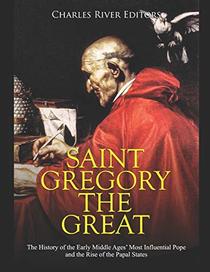As Pope Pelagius lay dying in 561 CE, troubles abounded in the Holy Roman Empire. There was the Plague of Justinian, wide-spread famine, and trouble coming from the Lombards. Because of the political situation at the time, the new pope would also have to be acceptable to the emperor in Constantinople. The only man who could possibly fit the bill was Gregorius Anicius, a Roman monk. At first, Gregory refused the delegation that came to make him pope. He didn't want it.
The author makes it dramatically clear that the centuries-long devastation of Rome left it with a mere 35,000 (or fewer) people still living in Rome (at the time of Gregory's rise to the office of Pope). The plague was the first thing Gregory attacked with a procession through the town. By then, the plague had probably run its course but in Italy, all malignancies were related to God (not fleas or pestilence). The procession boosted the morale of the people and things immediately changed (probably the placebo effect).
Although Gregory was pope for almost 14 years (a very long time in those days), he suffered constantly from poor health, including gout, poor indigestion, and fevers. As Pope, he exercised both political and spiritual powers. In spite of that, Gregory remained a monk, and constantly desired the seclusion of the cloister. Gregory struggled constantly with his responsibilities vs. his desire to retire from the world.
Gregory became 'the Great' sometime in the late 800s. Through his effective use of power, he increased the prestige and power of the papacy. He is known for his defense of Rome and his care of the poor. In fact, this book covers St. Gregory's legacy by explaining how later popes were more steadfast because of Gregory's influence. This book shows that the Papal States were abolished in 1870.
I must say that 47% of this book was spent setting the stage for Gregory the Great. I thought that a bit excessive. The number of references in the bibliography was quite impressive.
The author makes it dramatically clear that the centuries-long devastation of Rome left it with a mere 35,000 (or fewer) people still living in Rome (at the time of Gregory's rise to the office of Pope). The plague was the first thing Gregory attacked with a procession through the town. By then, the plague had probably run its course but in Italy, all malignancies were related to God (not fleas or pestilence). The procession boosted the morale of the people and things immediately changed (probably the placebo effect).
Although Gregory was pope for almost 14 years (a very long time in those days), he suffered constantly from poor health, including gout, poor indigestion, and fevers. As Pope, he exercised both political and spiritual powers. In spite of that, Gregory remained a monk, and constantly desired the seclusion of the cloister. Gregory struggled constantly with his responsibilities vs. his desire to retire from the world.
Gregory became 'the Great' sometime in the late 800s. Through his effective use of power, he increased the prestige and power of the papacy. He is known for his defense of Rome and his care of the poor. In fact, this book covers St. Gregory's legacy by explaining how later popes were more steadfast because of Gregory's influence. This book shows that the Papal States were abolished in 1870.
I must say that 47% of this book was spent setting the stage for Gregory the Great. I thought that a bit excessive. The number of references in the bibliography was quite impressive.




